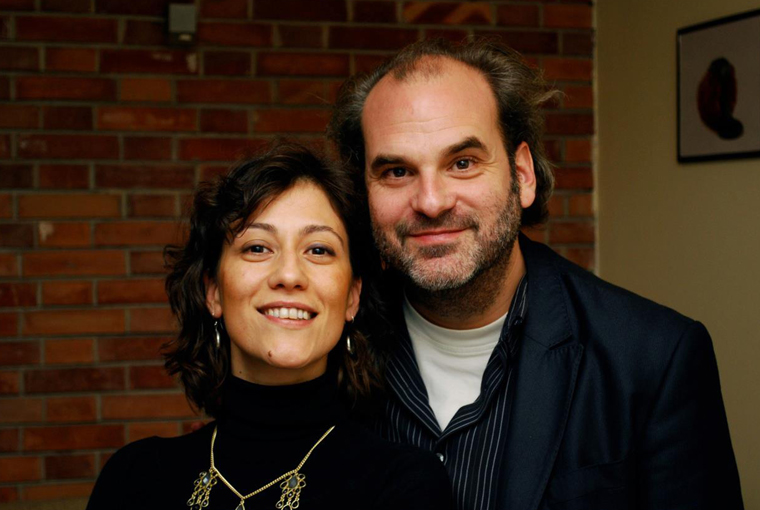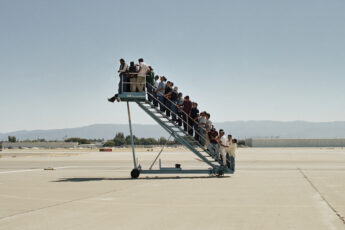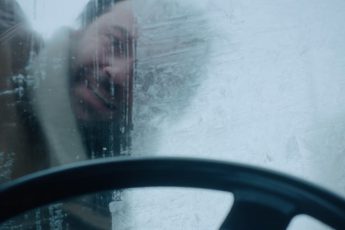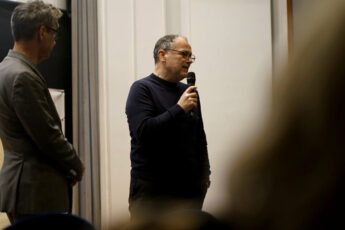
Filmmakers Iris Elezi and Thomas Logoreci respond to EEFB’s questions. Their film “Bota” was screened in the East of West section of the Karlovy Vary International Film Festival in 2014.
The film deals with a particularly traumatic moment of Albania’s past. Where did the idea for the film come from? What about the choice of the title Bota?
Iris Elezi: Upon completing my studies at NYU, I headed for neighboring Kosovo, where I directed a six-part documentary series on the Western Balkans titled Under Construction (2007). All the traveling and collecting of so many heartfelt stories incited a particular growth and understanding for me. And it was with this awareness that I started reflecting upon the sad and unique situation that my own people experienced during Communism. Upon my return from the US, I got back in sync with Albania and felt a different kind of pain in my people that I wanted to investigate further. Mainly, what are the daily confrontations and lingering traumas of men and women born and raised under extreme circumstances? How does one survive? How do we go on? But especially what interested us was the complicated relationship we have with our dark past. That’s why we decided to show a panorama of contemporary Albania, focusing on people that are caught in-between time, who see the future but can’t understand what their place will be in it. I strongly feel that Bota, while opening a window into little-known Albania, also appeals to all people who will see a reflection of their own struggles. Hence the title of the film which means ‘world’ in Albanian.
How did you decide on the acting cast? For instance, Noje is played by Tinka Kurti, a renowned Albanian actress who had starred in over thirty films during the Kinostudio era, including the first Albanian feature film, “Tana” (“Kristaq Dhamo”, 1958). Was this a deliberate choice?
Iris Elezi: Yes, casting the wonderful Tinka Kurti, the woman that is the Albanian Lillian Gish, was definitely a deliberate choice on our part. Understandably, given the nature of Bota, it was incredibly important for us to pay respect to all the talented people that have contributed to our culture over the years. We invited Tinka Kurti and had the privilege to work with the very first female protagonist of Albanian cinema. This was Tinka’s eighty-seventh role of her long career in film, theater and television. Having her on set proved to be not just a real pleasure, but we also took a lot from her. We are also proud to have cast some of the key figures from the golden days of the Kinostudio film studio such as Artur Gorishti, the protagonist of Kujtim Çashku’s 1983 The Warm Hand and the amazing character actor Guljelm Radoja. They were also incredibly generous and welcoming to the rising young stars of contemporary Albanian cinema, the gorgeous Fioralba Kryemadhi and Amos Zaharia of Der Albanier (2010) and Tristan Halilaj of Forgiveness of Blood (2011). There’s also something else interesting in our conscious relationship with the former Kinostudio. After 24 years of abandoning this practice, Bota is the first film that entirely built its main set from scratch, the Bota bar. At first we were considered crazy, but when you look at Bota, one can clearly see that the bar is the very heart of the film. Having a working bar added so much to the production value of the film and it also helped the performances of the actors immensely.
There are several references to Ismail Kadare’s novel “The General of the Dead Army”? Did you approach your film as a potential cathartic exercise in dealing with the history of Albania?
Thomas Logoreci: Me and Iris spend a lot of time each year watching Albanian movies from the Communist past. We take so much understanding as well as pleasure from them. Even fiction films give us such a vital documentation of Albania in the Communist time. And of course, it’s impossible to ignore the impact of Ismail Kadare on Albanian culture, no matter how you feel about his collusion with the dictatorship. For me, growing up in California, reading Kadare’s General of the Dead Army in junior high school was a watershed experience. Because up until then, Albania only meant bright Communist postcards and red-colored propaganda magazines. Kadare’s Albania in the novel was this desolate, haunted universe.
In Bota, we tried to pepper a bunch of references to Albanian cinema and literature. Towards the end of the movie, there is a shot in which the actress playing the grandmother, Tinka Kurti, watches the young dancing woman from the 1989 adaptation of General of the Dead Army. The year 1989 was the last grasp of the Communist regime and of the old Kinostudio system. So, for us, it makes sense, that the star of Albania’s first movie Tana should be watching the passing of an era right before she dies. The image of the dancing woman itself, from Dhimiter Anagnosti’s film, has stayed with us for many years. It’s eerie. You never see who this woman is dancing with. I have always looked at it as if it is Albania itself trying to draw the world’s attention to itself after so many years in isolation.
The film has a very dream-like feel…
Thomas Logoreci: Iris and I had many discussions while we worked on the screenplay about the insistence of an absolute truth by many Albanians, young and old. Maybe it’s a leftover from Socialist Realism, but we even come across film students today who believe that their script idea or completed film will tell one single truth about what it is to live in Albania. With Bota, we wanted to create a place that has elements of fantasy, yet is honest about the complex and often contradictory emotional lives of the characters. If you cut to the very naked heart of it, the Bota café is the pure, wide-eyed dream of Albania itself. The highway is Europe, the world that is bringing change and transformation. The final shot of the ghost Nora dancing to tango is an attempt to meld all these spinning plates – the old, the new, the sense of overwhelming history that everyone tries to ignore but which can’t be shaken so easily.
However, the film ends on a hopeful note. Do you see the future for and hope of Albania as a country and its people in the acknowledgment of the past’s phantasms?
Iris Elezi: As it is, Albania is one of the only two countries left in the Eastern bloc that has yet to open up the Communist dossiers. Difficult as it was, we know that it was the right thing to handle such a timely and sensitive issue. Since its inception, Bota has always been a case study of that single moment before we finally take action. The main character Juli sees the future staring right at her, yet the past is so overwhelming that it hinders her to jump into life. That’s why an earlier draft was even titled It Starts Somewhere. I’m happy that the light that I embedded in the script shines through the wonderful work of our cinematographer Ramiro Civita. I strongly believe that we can’t go forward until we fully become aware of what we were capable of doing to ourselves. We must deal with this deep wound before we are able to embrace a better future. I fear that the superficial handling of our past can only leave us more wounded than we already are. That’s why, in my opinion, the last shot of the film offers the viewer the possibility to breathe and wonder: for how much longer will the ghosts of the past be with and within us?
Few Albanian films are produced each year – could you tell us something about the challenges behind the production process?
Iris Elezi: I believe that filmmaking is sometimes just overcoming obstacles. And in my case, with Bota, the obstacles were too enormous to count. First and foremost, what I had against me, even more than being a female director, was that I was coming from the world of documentary. Here I was with a strong script that received stamps of approvals from several international development funds, yet found it incredibly difficult to interest producers willing to jump aboard. And the fact that I came from Albania made it even more risky for co-producers to join the project. I just believed wholeheartedly in the script and I knew that I had tapped into something very special. So together, Thomas and I just kept going, always rewriting the script amd working with the actors while we kept trying to raise the necessary funds. The moment our key producer came on board things fell into place. We were fortunate to work with some of the top Italian, Albanian and Kosovar professionals so we managed the shooting of the film wonderfully, even finishing two days ahead of schedule. Of course, it was hard to shoot in our magical location where access to water and electricity had to be installed first, but the community opened their homes and hearts to the crew, making it a bit easier and all the more memorable.
How was the film received by audiences and critics?
Iris Elezi: The premiere at Karlovy Vary was truly an unforgettable experience. While we hoped that the film would be able to communicate well with the public, we never thought that our humble film would be a favorite with critics as well. At Karlovy Vary, we won the FEDEORA Critics award, a pleasure that we experienced again at the Reyjkavik International Film Fest, where we received the FIPRESCI and the audience award. When we travel to festivals, we always stay in the theater with the audience. It’s amazing what viewers around the world connect with, hearing the laughter and sometimes tears. The screenings in Tirana were also quite emotional since the performances, the sad beauty of the location and especially the use of music touched people of all ages. During the month of November, Bota screened in national cinemas for three weeks – which is almost a record for an Albanian film. In Goteborg we had the chance to screen the film for dozens of Albanians émigrés who had traveled over 100 km to see the place where they once lived. Yet in Albania we became aware that some people had waited a whole lifetime to see some fragments of the lives they have led finally put on screen.
Thank you for the interview.




Is she serious? She answer like a graduated student.